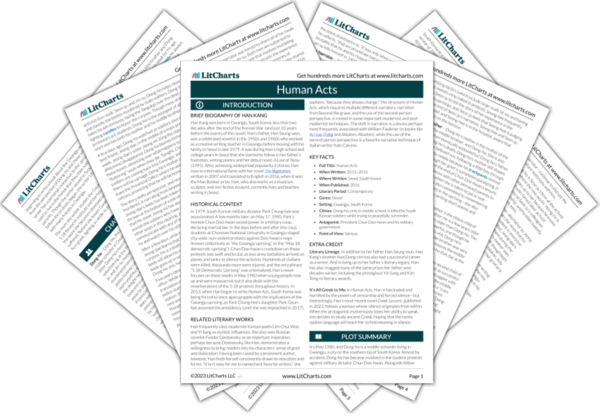Yeong-chae Quotes in Human Acts
Kids crouching beneath the windows, fumbling with their guns and complaining that they were hungry, asking if it was OK for them to quickly run back and fetch the sponge cake and Fanta they'd left in the conference room; what could they possibly have known about death that would have enabled them to make such a choice?

Unlock explanations and citation info for this and every other Human Acts quote.
Plus so much more...
Get LitCharts A+At that moment, I realized what all this was for. The words that this torture and starvation were intended to elicit. We will make you realize how ridiculous it was, the lot of you waving the national flag and singing the national anthem. We will prove to you that you are nothing but filthy, stinking bodies. That you are no better than the carcasses of starving animals.
[…] Watery discharge and sticky puss, foul saliva, blood, tears and snot, piss and shit that soiled your pants. That was all that was left to me. No, that was what I myself had been reduced to. I was nothing but the sum of those parts. The lump of rotting meat from which they oozed was the only “me” there was.
Looking at that boy's life, Jin-su said, what is this thing we call a soul? Just some nonexistent idea? Or something that might as well not exist? Or no, is it like a kind of glass? Glass is transparent, right? And fragile. That's the fundamental nature of glass. And that's why objects that are made of glass have to be handled with care. After all, if they end up smashed or cracked or chipped, then they're good for nothing, right, you just have to chuck them away.
Before, we used to have a kind of glass that couldn't be broken. A truth so hard and clear it might as well have been made of glass. So when you think about it, it was only when we were shattered that we proved we had souls. Though what we really were was humans made of glass.

Yeong-chae Quotes in Human Acts
Kids crouching beneath the windows, fumbling with their guns and complaining that they were hungry, asking if it was OK for them to quickly run back and fetch the sponge cake and Fanta they'd left in the conference room; what could they possibly have known about death that would have enabled them to make such a choice?

Unlock explanations and citation info for this and every other Human Acts quote.
Plus so much more...
Get LitCharts A+At that moment, I realized what all this was for. The words that this torture and starvation were intended to elicit. We will make you realize how ridiculous it was, the lot of you waving the national flag and singing the national anthem. We will prove to you that you are nothing but filthy, stinking bodies. That you are no better than the carcasses of starving animals.
[…] Watery discharge and sticky puss, foul saliva, blood, tears and snot, piss and shit that soiled your pants. That was all that was left to me. No, that was what I myself had been reduced to. I was nothing but the sum of those parts. The lump of rotting meat from which they oozed was the only “me” there was.
Looking at that boy's life, Jin-su said, what is this thing we call a soul? Just some nonexistent idea? Or something that might as well not exist? Or no, is it like a kind of glass? Glass is transparent, right? And fragile. That's the fundamental nature of glass. And that's why objects that are made of glass have to be handled with care. After all, if they end up smashed or cracked or chipped, then they're good for nothing, right, you just have to chuck them away.
Before, we used to have a kind of glass that couldn't be broken. A truth so hard and clear it might as well have been made of glass. So when you think about it, it was only when we were shattered that we proved we had souls. Though what we really were was humans made of glass.











